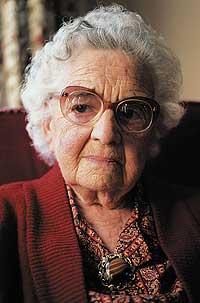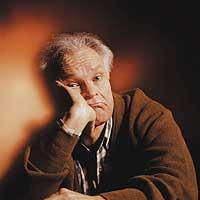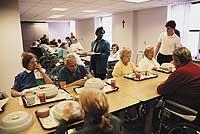Aged but with young head

Older people greatly value good memory performance, relate memory loss to a poor cognitive level, and consider it to be the onset of dementia. In many cases, however, it is an excess of responsibility, since, according to current research, memory is a high-level psychological process that can be trained.
Special situation of the elderly
When a person ages he may lose his memory, but that loss is not sustainable and does not have to constantly worsen in all people. Memory often works properly throughout life. Memory loss is therefore not mandatory or irreversible.
On the other hand, lack of memory and forgetfulness worry more than the older young person. However, at any age memory can be trained and improved, and the fact that older people have memory errors is in many cases a symptom of lack of practice. However, these errors are interpreted differently depending on age, so that the older person believes that it is “normal” and that it is “thing” that occurs with age, while in young people and adults there are many excuses: stress, work, responsibilities, etc.

The low degree of motivation and lack of interest negatively affect memory in all ages, but in old age this influence is even more evident, since often the state of health is not good, nor the mood, and other factors such as the loss of their social role, the death of loved ones, etc.
At the same time, memory loss reduces the elderly's self-esteem, which can cause emotional problems or increase in existing ones. But if you manage to have a clear mind, the benefits are enormous, since increasing the self-esteem of the older person becomes more autonomous and a better quality of life is achieved.
With the benefits of keeping memory in shape, it is clear that it is very profitable to form it. But how is the mind formed? Exercises done, of course.
Forming memory
If in daily activities, such as talking to friends, reading the newspaper or
listening to the radio, you want to have a good level of memory, it is essential to be alert. Memory strategies are of great help for these activities if used properly.
One of these strategies is representation, that is, seeing what you want to remember without being present with all its characteristics. For example, a room in the house or town hall. A small advantage to using this strategy is that memory has itself a large image storage capacity. Therefore, in many cases, when making the stories through mental images, memory uses this strategy automatically.

Another strategy that is used to store the information that you want to remember later is the association. In this case, what you want to remember (new information) is related or associated with an already saved memory (old information). This strategy is very useful, for example, to remember names and numbers. Think, for example, that we have been introduced by a boy named Xabier. If we want to remember the name, we can relate it to another Xabier we know. “Xabier, like my little cousin.”
To remember numbers the same thing is done. Suppose we want to remember the credit card code. If the number is 1,487, for example, dividing the number into two (14 and 87) and using other remembered information, the following links can be established: “14, age of the eldest son” and “87, year of the birth of the youngest daughter”.
As can be seen in these examples, the association is personal. Therefore, there are no direct or erroneous associations. They can be simple, strange, logical or illogical, but the important thing is that it has meaning for anyone who wants to train memory.
Another memory strategy is repetition, undoubtedly one of the best known. As the name suggests, to facilitate the memory of the information is repeated. Repetition can be done on a superficial level, literally repeated. It does not require great efforts and is useful for storing information for a while, but not for storing it for a long time. To do this, we must repeat the information working.

In this case, individual knowledge is also used to work on information. For example, “Tomorrow I have a consultation with the doctor at five in the afternoon”, repeat the phrase literally, that is, it is not enough to make a superficial repetition, and also you have to work the imagination; you can remember a clock that is touching the five or the number 5, and remember the doctor’s consultation, for example.
There is another strategy known as categorization. Depending on this, what you want to remember is organized into different blocks, using a common feature of information. For example, this strategy can be used to make regular purchases and is widely used.
Imagine we have to buy ham, chicken breasts, apples, small peas, strawberries, cheese, cherries, a kilo of fillets, beans, soap for washing machine and milk. Using the categorization strategy, the shopping list is classified using a common feature. For example, one category may be meat, including steaks and chicken breasts; another group may be charcuterie (ham and cheese); the third category is fruit (apples, strawberries and cherries); the fourth category is vegetables (beans and small peas); and the fifth category may be soap washing machine and milk. This way, instead of remembering a long list of names, they are distributed into smaller groups and once in the store it is easier to remember all.
Memory functions
Memory problems arise when the memory itself is fixed. You may think that memory is like a great file. The memory process is divided into three phases, three main memory functions.

In the first phase or in the registry a certain information is detected that will then become memory. That is, the information is collected and clearly written on a tab to be saved in the memory file. The more attention we pay, the easier it will be to record a memory and the level of attention is directly related to motivation.
The second phase is the storage of the collected information, also called storage or conservation. Once the tab is written, it will be saved in the appropriate folder with the corresponding title, so that it can be easily accessed in the third phase of recovery or memory.
But if motivation is important for memory and is not recorded correctly, it does not become a memory.
Memory problems may be due to the malfunction of one of these three phases of the process. Sometimes it is impossible to remember because the information was not recorded, but in most cases the problem is that it was not stored properly. Therefore, it is very important to organize memories well in the first and second phase

The formation of memory affects this whole process. Memory problems focus mainly on coding during old age. To improve the functioning of this process, among other things, you can simplify and summarize the information you want to learn. In short, few and many times the key is in the norm, and in this it helps to ensure that what must be done has been well understood, that what must be done with the words themselves is repeated, that the information is related to something known and that other techniques are used.
Where do I have my head!
In most cases, older people forget everyday things for lack of attention. It is common for them to enter a room and forget what they have gone, to look for the keys, to go shopping and forget what they have to buy, to lose the thread of the conversation, that it is difficult to remember the new information...
These forgetfulness occur at any age, but are more frequent in older people and acquire a negative sense. Training in attention and learning coding techniques can correct these errors. And there are older people who maintain their interest in the environment, who develop hobbies and work the mind, who have the head clearer than those who leave intellectual actions after retirement.

Memory problems are more related to emotional disorders than to loss of consciousness.
That is, faced with emotional problems (disinterest, lack of desire to do things, sleep problems, etc.) reduces the level of attention and concentration with the environment, thus decreasing the ability to remember the new information.
It is very important to have a clear head throughout life. When the mind fails, forgetfulness can have mild consequences, such as not remembering the name of a newly known person, or going to a home room and not knowing what.
But it can also have more serious consequences, such as whether or not the gas has been shut down or not to remember to take medicine. In this case, the older person will need the help of another. This means a loss of autonomy. In addition, the older person does not feel helpful and decreases their self-esteem.
Buletina
Bidali zure helbide elektronikoa eta jaso asteroko buletina zure sarrera-ontzian











